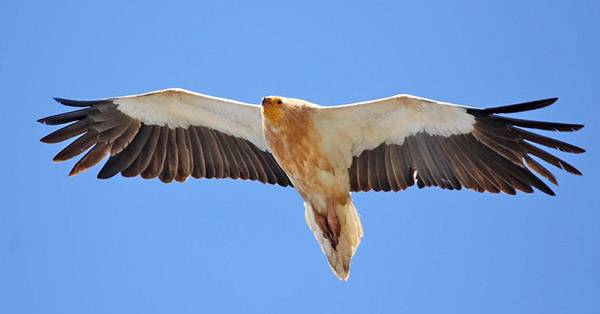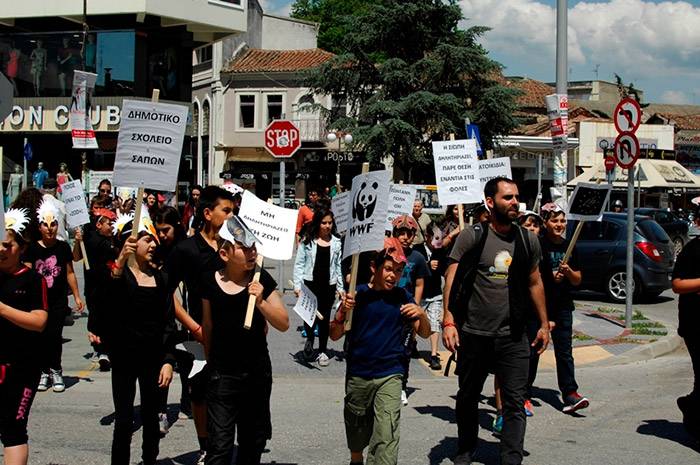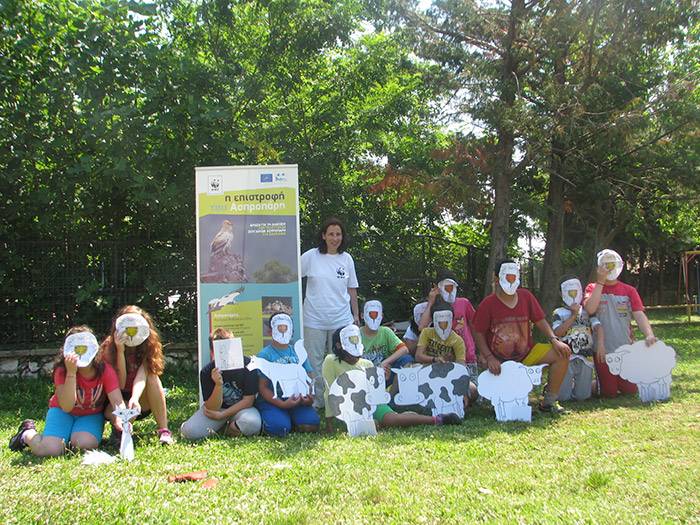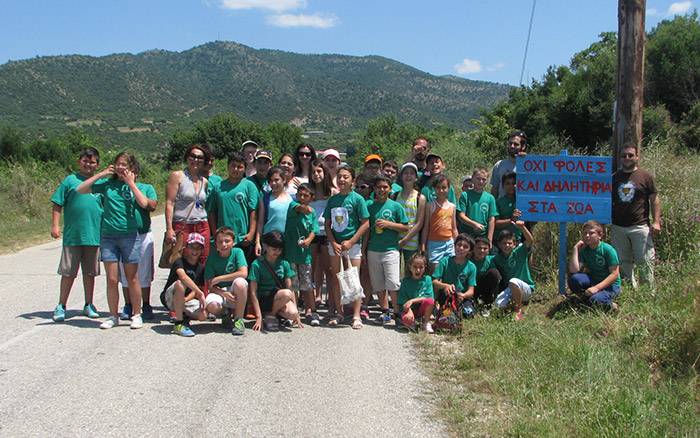How students of Thrace help the Egyptian Vulture
Guest blog by Christy Sotiriou on behalf of the WWF Greece Dadia Programme

Five years ago, in 2013, WWF Greece and its team located in Dadia village in the northwestern part of the Evros regional unit, begun a beautiful journey of awareness, having as ultimate destination the safeguard of the Egyptian Vulture. Why did we choose that species? Because it is the smallest and most threatened species in Greece, as only 5 pairs are left in the country, while during the last thirty years the Greek population has been dramatically decreased.
This journey that celebrates its 5th anniversary is translated actually into a campaign targeting the local communities of Thrace, while placing the region’s new generation at the epicenter of the awareness activities. The local students were given an important role to play for the promotion of the Egyptian vulture’s protection from the poisoned baits, as the species population has undergone a dramatic decline during the last years, which is largely due to the illegal use of poisoned baits primarily targeting mammals falsely considered as “harmful”(e.g. wolves, foxes). Unhappily, in most cases scavengers, like the Egyptian Vultures, fall victims of this illegal practice and are considered as “collateral damage”.

The idea to engage the local schools and students for that cause was simple, yet substantial! Our proposal was to create a mini-project called “symbolic adoption of the remaining Egyptian Vultures in Thrace”, calling the local schools to “adopt” the closest pair to their village. The “adoption” does not entail any financial aid, as we believe that it would generate more engaging results. And that’s proved true! Through the “adoption”, a great number of students every year come closer to nature and the Egyptian Vulture’s life and threats.
During the last 5 years, all over Thrace, 5 schools and 120-160 students, who were helping us on an annual basis, aged 11 to 15 years old, joined their voice and creativity with ours and put the Egyptian Vulture under their wings, by interacting with their co-villagers and informing them about the vulture’s uniqueness and need for protection.

To that end, WWF Greece-Dadia team, in collaboration with teachers, designed educational activities for the students, including interactive presentations, audio-visual material and experiential activities that would enable them to understand better the negative impact of poisoning on vultures. Through these activities, the students had the chance to use their creativity and imagination, preparing informative material (leaflets, questionnaires, placards) that was shared with their neighbors, relatives, and the rest of the local society, as part of the outdoor activities that took place in their own villages and the two closest capital cities, Alexandroupoli and Komotini. Furthermore, the students created large and inspirational graffiti in their schools, as well as wooden signboards which were placed on roads, from where key audiences for the vulture’s survival, like local farmers, breeders and hunter, pass by.

“There is nothing more inspiring and vivid than interacting with the young generation. And it gets much better when students and the local schools communities join their forces with us over a common goal: to contribute to the protection of the Egyptian Vulture, through activities that are designed to inform, inspire & invite more people to support our efforts, as well as to increase people’s awareness on the vulture’s significance. For 5 years now, our work gets an even greater value, as it has the footprint of hundreds of students. You can’t imagine how happy we feel, when we encounter many people who tell us that they have learned about the Egyptian Vulture from their interaction with the students!”, stated Theodora Skartsi, Head of Dadia program, WWF Greece.
This journey hasn’t come to an end. WWF Greece’s close interaction with the same schools and students will continue, so as to engage the future generations of the region and help the Egyptian Vulture revive!
The Egyptian Vultures’ symbolic adoption by the students of Thrace was part of the LIFE10 NAT/BG/000152 project, entitled “Urgent measures to secure the survival of the Egyptian Vulture (Neophron percnopterus) in Bulgaria and Greece” that is implemented in collaboration with the Bulgarian Society for The Protection of Birds (BSPB), the Hellenic Ornithological Society (HOS), the World Wildlife Fund-Greece (WWF) and the Royal Society for the Protection of Birds (RSPB). It is financed by the EC programme LIFE+, the A.G. Leventis Foundation and the GREEN FUND.
Editorial Comment
Whilst this education campaign is in a country outside OSME’s region, we thought such an exciting and important contribution to helping a globally Endangered species should be shared widely in Middle East countries.
See these videos:
